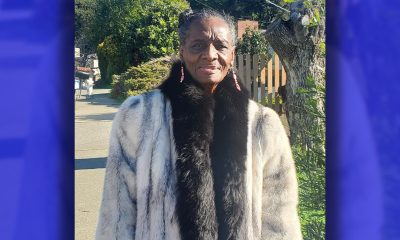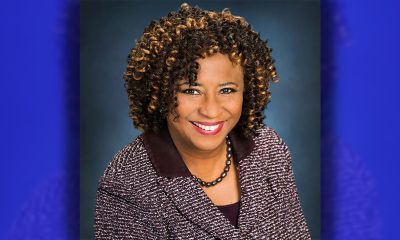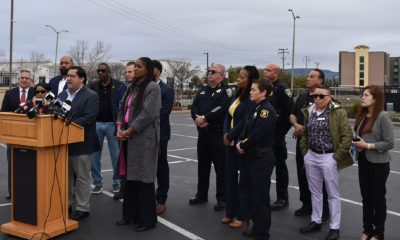Featured
Opinion: Uber’s Not Coming, What Did We Learn?

In August, Uber announced that it’s probably not coming to Oakland after all and will likely put the former Sears building back on the market. Since the issues of gentrification and displacement that caused The Greenlining Institute and others to form the No Uber Oakland campaign haven’t gone away, this might be a good time to ask what we’ve learned, and how we move forward.
When Uber announced its initial plans that would likely move 2,000-3,000 highly paid tech workers into downtown Oakland, we were alarmed about the impact on Oakland’s residents, workers, small businesses, nonprofits and artists. We’ve all seen what happened when San Francisco rolled out the red carpet to big tech companies: Skyrocketing housing costs left even families with six-figure incomes struggling to find adequate housing, while soaring commercial rents priced out nonprofits – and all of this badly undermined the city’s diversity and character.
Much the same continues to happen in Oakland, where the average one bedroom apartment currently rents for $2,025 per month – making it the country’s seventh most expensive rental market, according to Abodo, an apartment rental listings website. That’s just not viable when Oakland’s median household income is $54,618.
We launched No Uber Oakland only after months of unsuccessful efforts to meet with Uber’s leadership and have a serious dialogue about the company’s plans for supporting Oaklanders. While the company made some token gestures, it became clear it was never really serious about listening to Oaklanders or being part of our community. On the No Uber Oakland site, we laid out a 10-point platform that Uber could adopt if it was really serious about working with the Oakland community.
Meanwhile, Uber continues to struggle with bad press, declining market share, questions about whether it will ever be profitable, and leadership struggles. Arrogance and insularity don’t constitute a long-term growth strategy. For tech companies to truly succeed, they must embrace good corporate governance and responsibility, and uplift – rather than just exploit — the local communities that surround them and make up their customer base.
That also means opening up good tech jobs and leadership positions to all of California’s diverse population. Right now, tech remains a fortress where Latinos and African Americans are drastically underrepresented and leadership remains overwhelmingly white and male.
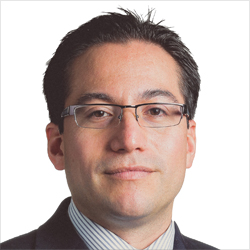
Orson Aguilar
But we’ve also learned that companies won’t reform on their own. Local governments, including Oakland’s, must look at the broader picture when any big corporation – not just tech – wants to move into town. Of course we want companies to grow and invest in Oakland, but no good will come from pretending there won’t be downsides in a town where working families, artists and community groups already struggle to keep a roof over their heads. In the future, city leaders must work with the community to make sure companies act responsibly and that the rising tide of corporate investment doesn’t drown ordinary Oaklanders.
Orson Aguilar is president of The Greenlining Institute.
Antonio Ray Harvey
Sacramento Lawmakers Step Up Push for “Smart Solutions” on Crime, Public Safety
Assemblymember Tina McKinnor (D-Inglewood) and Sen. Lola Smallwood-Cuevas (D-Ladera Heights), both members of the California Legislative Black Caucus (CLBC), have joined other lawmakers and criminal justice reform advocates to address public safety in the state. On April 2, CLBC members gathered outside the State Capitol for the unveiling of the #SmartSolutions Public Safety Policy Platform, a package of 30 bills that addresses the top concerns of retailers, retail workers, the fentanyl crisis, and support for victims and survivors of crime.
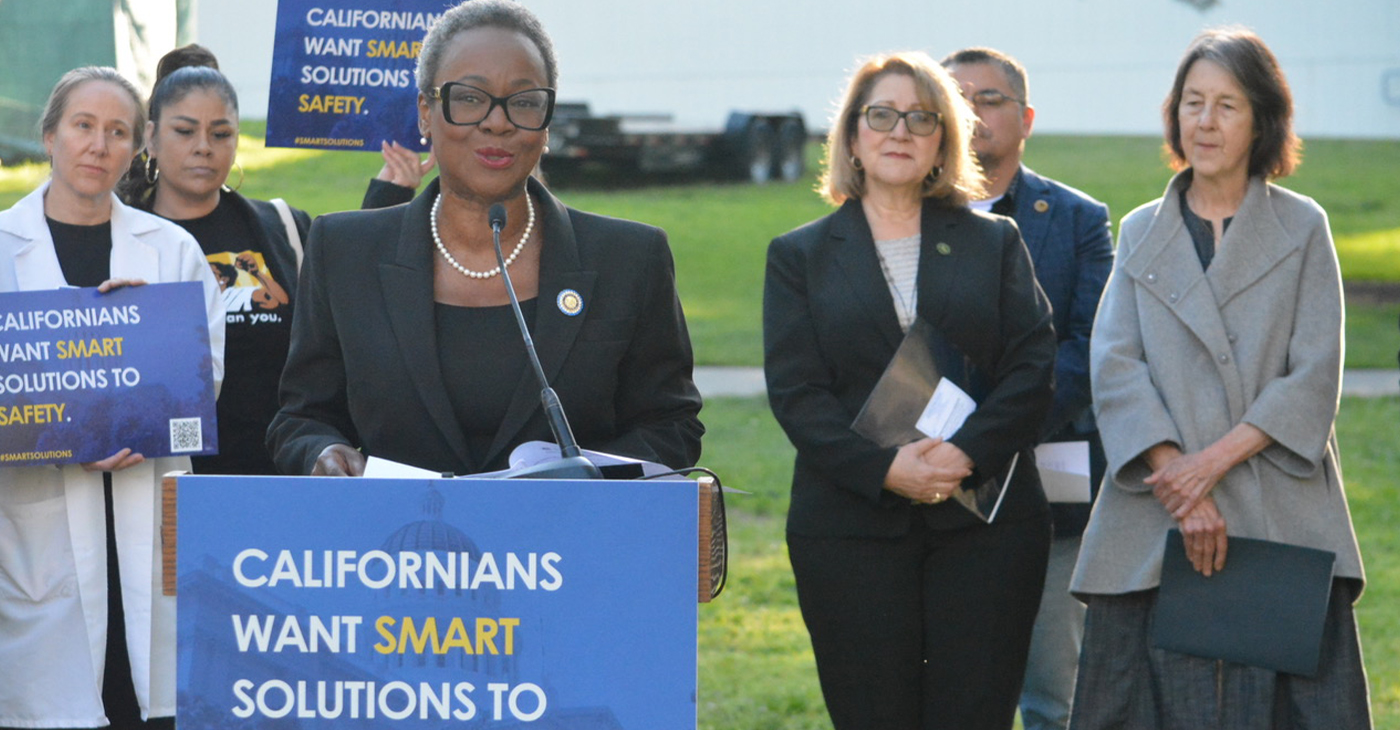
By Antonio Ray Harvey, California Black Media
Assemblymember Tina McKinnor (D-Inglewood) and Sen. Lola Smallwood-Cuevas (D-Ladera Heights), both members of the California Legislative Black Caucus (CLBC), have joined other lawmakers and criminal justice reform advocates to address public safety in the state.
On April 2, CLBC members gathered outside the State Capitol for the unveiling of the #SmartSolutions Public Safety Policy Platform, a package of 30 bills that addresses the top concerns of retailers, retail workers, the fentanyl crisis, and support for victims and survivors of crime.
“Instead of being tough on crime, we need to be smart on crime,” Smallwood said at the press briefing. “I am not saying that we’re not going to be holding folks accountable for the actions that they take. But we will not rely on incarceration as a solution.”
McKinnor, Smallwood-Cuevas, a coalition of advocates, addiction treatment experts, and Yurok Tribal leaders joined Sen. Nancy Skinner (D-Berkeley), and Assemblymember Eloise Gómez Reyes (D-Colton) at the press conference organized to promote legislative solutions that ensure safety and justice.
Organizers say #SmartSolutions is an intersectional campaign that combats criminalization and mass incarceration by pushing for the redirection of state resources to fund housing, health care, schools, services for victims, and programs that reduce recidivism and promote accountability, beyond incarceration.
Opponents of the bills proposed in the #SmartSolutions campaign say their colleagues who support reform-focused strategies are looking the other way on crime and encouraging lawlessness.
For example, Assemblymembers Wendy Carillo (D-Boyle Heights), Carlos Villapudua (D-Stockton) and Mike Gipson (D-Carson) are supporting Assembly Bill (AB) 1990, legislation that would allow a peace officer to arrest shoplifters without a warrant or without witnessing the theft.
Assemblymember James Ramos (D-Highland) authored AB 1772 and introduced it in January. The legislation proposes sterner penalties for retail theft, particularly for repeat offenders.
The #SmartSolutions campaign is co-sponsored by Ella Baker Center for Human Rights, Smart Justice California, American Civil Liberties Union (ACLU) California Action, Californians for Safety and Justice, and Californians United for a Responsible Budget (CURB).
Smallwood recently introduced two bills she hopes will provide solutions to the escalating retail theft problem in the state. Senate Bill (SB) 1446 addresses theft, technology and job security in retail establishments and aims to minimize workplace violence, according to supporters. SB 1282 requires counties to expand the use of a diversion program for theft cases.
“Restorative Justice is the essential pillar of making our criminal justice system more fair, just, and equitable,” McKinnor said. “Restorative justice recognizes the trauma of victims and preparatory of crimes and provides a constructive space for victims to find healing.”
Dr. Amiee Moulin, founder of the California Bridge program and chief of the Division of Addiction Medicine at the University of California (UC) Medical Center, said drug “addiction and overdose” are taking a toll on patients, families and the community.
“I believe that California’s proposed legislation focused on expanding access to treatment is a crucial step towards saving lives,” Moulin said. “By removing barriers to care and embracing evidenced-based strategies we can provide patients the support they need to heal and recover.”
Bay Area
Rich Lyons, Longtime Campus Business, Innovation Leader, Will Be UC Berkeley’s Next Chancellor
Rich Lyons, an established economist, former dean of the Haas School of Business and the campus’s current leader for innovation and entrepreneurship, will become the next chancellor at the University of California, Berkeley, the UC Board of Regents announced on April 10.
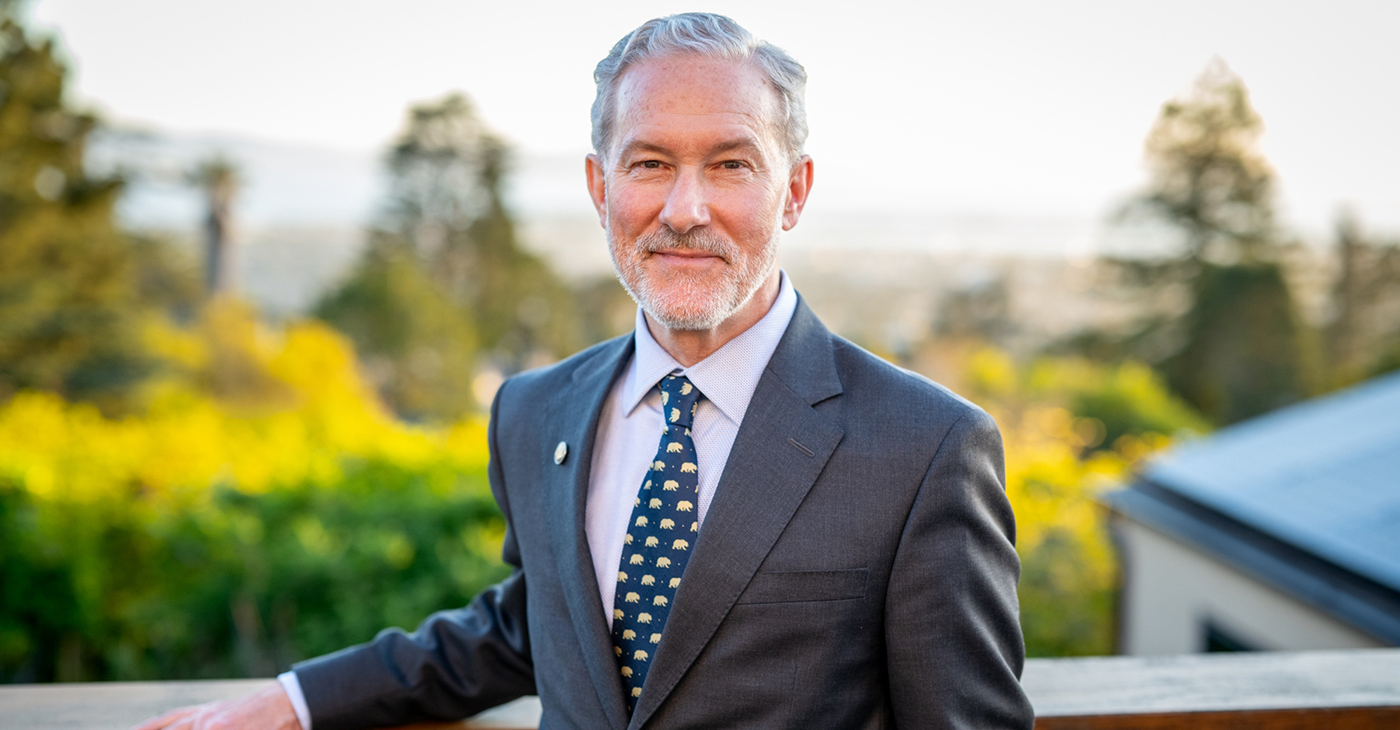
By Jason Pohl
Rich Lyons, an established economist, former dean of the Haas School of Business and the campus’s current leader for innovation and entrepreneurship, will become the next chancellor at the University of California, Berkeley, the UC Board of Regents announced on April 10.
The board’s unanimous confirmation makes Lyons, 63, the first UC Berkeley undergraduate alumnus since 1930 to become the campus’s top leader. In an interview this week, Lyons said he credits his Berkeley roots and his campus mentors with encouraging him to ask big questions, advance institutional culture and enhance public education — all priorities of his for the years to come.
Lyons, who will be Berkeley’s 12th chancellor, will succeed Chancellor Carol Christ, who announced last year that she’d step down as chancellor on July 1.
“I am both thrilled and reassured by this excellent choice. In so many ways, Rich embodies Berkeley’s very best attributes, and his dedication to the university’s public mission and values could not be stronger,” Christ said. “I am confident he will bring to the office visionary aspirations for Berkeley’s future that are informed by, and deeply respectful of, our past.”
Rising through the Berkeley ranks
Born in 1961, Lyons grew up in Los Altos in the early days of the Silicon Valley start-up boom.
He attended Berkeley, where he graduated in 1982 with a Bachelor of Science degree in business and finance. Lyons went on to earn his Ph.D. in 1987 in economics from MIT. After six years teaching at Columbia Business School, Lyons returned west, where in 1993 he joined the Berkeley faculty as a professor of economics and finance, specializing in the study of international finance and global exchange rates.
He’s remained on campus since, with one notable exception.
Starting in 2006, Lyons spent two years working at Goldman Sachs as the chief learning officer. It was a period that instilled in him an appreciation for leadership and the importance of organizational culture.
He carried those lessons with him when he returned to campus in 2008 and became the dean of the Haas School of Business.
While dean, Lyons oversaw the construction of Connie & Kevin Chou Hall, a state-of-the-art academic building that opened in 2017 and is celebrated for its sustainability. He also helped establish two new degree programs, linking the business school with both the College of Engineering and the Department of Molecular and Cell Biology.
But it was his creation of four distinct defining leadership principles that spurred a sweeping culture initiative at the school that stands out in the minds of many. Those values — question the status quo, confidence without attitude, students always, and beyond yourself — became a creed of sorts for new students and alumni alike.
Those values are important, Lyons said, because they shape and support the cohesive structure of a strong, connected community — spanning science and technology to the arts and humanities. They also convey the story about what it means to be at Berkeley and to believe in the university’s public mission.
“When we are great as educators, it’s identity-making,” Lyons said. “We’re helping students and others see identities in themselves that they couldn’t see.”
Lyons in January 2020 became Berkeley’s first-ever chief officer of innovation and entrepreneurship.
Building on his research exploring how leaders drive innovation and set behavioral norms and culture, Lyons worked to expand and champion Berkeley’s rich portfolio of innovation and entrepreneurship activities for the benefit of students, faculty, staff, startups and external partners.
It was a major commitment to thinking outside the box, he said. One need only look to the Berkeley Changemaker program that he helped launch in 2020 to see innovation and entrepreneurship in action.
The campuswide program with some 30 courses tells the story of what Berkeley is — the story that members of the Berkeley community can tell long into the future. Berkeley Changemaker started as an idea and its courses quickly became among the most popular academic offerings on campus.
“Over 500 students showed up,” he said. “Why? Because it’s a narrative. It’s not just a name. It’s not just a curriculum. It’s not just a course. It’s a way of living, and it’s a way of living that Berkeley has occupied forever. This idea that there’s got to be a better way to do this, question the status quo.”
Activism
Oakland’s ‘Green the Church,’ Others, Host a Climate Revival
On April 20, Oakland’s Green The Church California (GTC) and the Center For Food, Faith and Justice will celebrate Earth Day and present a Climate Revival event titled “Growing Healthy Communities From Soil To The Soul” at McGee Avenue Baptist Church at 1640 Stuart St, Berkeley, CA. The day will include inspiring talks, interactive workshops, networking opportunities, and a special panel on Food Sovereignty and Global Food Resilience.

Growing Healthy Communities from Soil to the Soul in Berkeley
By Y’Anad Burrell
On April 20, Oakland’s Green The Church California (GTC) and the Center For Food, Faith and Justice will celebrate Earth Day and present a Climate Revival event titled “Growing Healthy Communities From Soil To The Soul” at McGee Avenue Baptist Church at 1640 Stuart St, Berkeley, CA,
The day will include inspiring talks, interactive workshops, networking opportunities, and a special panel on Food Sovereignty and Global Food Resilience.
The keynote speaker is Rev. Danté R. Quick, PhD, senior pastor of First Baptist Church of Lincoln Gardens in Somerset, N.J. Quick is well known in the Bay Area, having served for more than 10 years as pastor of Friendship Missionary Baptist Church in Vallejo, CA.
Green The Church, founded in 2010 by Rev. Dr. Ambrose Carroll, Sr., and headquartered in Oakland, helps galvanize Black churches and their local communities and leaders to address issues critical to populations historically disengaged from conversations around pollution and health, climate change, and sustainability and energy efficiency.
The organization collaborates with major environmental, sustainability, food security, faith, and community-based non-profit organizations, and is committed to “creation justice”—care and justice for God’s people and the planet—and building the Beloved Community.
Environmental justice has long been a pressing concern for communities of color who bear the brunt of pollution and ecological degradation. Climate change exacerbates these issues, disproportionately impacting vulnerable communities. Recognizing this urgency, Black churches across the country are taking action.
With deep roots in the African American community and its commitment to social justice, the Black Church has become an essential advocate for sustainable practices and policies.
Over the past 14 years, in a powerful collaboration with significant environmental, sustainability, food security, faith, and community-based non-profit organizations, GTC has created a cadre of Black churches engaging in the environmental justice, climate, and sustainability movement.
GTC presently works with more than 1,000 pastors and congregations across the U.S., and groups in the Bahamas, Ghana, Nigeria, and the UK, showing that we can make a difference together.
The partnership between environmental justice advocates and the Black Church extends beyond individual congregations. Green The Church provides resources and support for faith communities seeking to address climate change and promote environmental justice.
Through collaboration, initiatives such as energy efficiency programs, solar installations, and environmental education have been implemented in Black churches nationwide. These efforts reduce the carbon footprint and save money on energy bills, benefiting the congregations and their communities.
The involvement of the Black Church in the fight against climate change is not just a participation, it’s a powerful message that galvanizes action across communities.
By integrating environmental justice into their ministry, Black churches are demonstrating that addressing climate change is not only a matter of science but also of social and moral responsibility, inspiring change at a grassroots level.
For more information, go to: www.greenthechurch.org.
-

 Activism4 weeks ago
Activism4 weeks agoOakland Post: Week of March 20 – 26, 2024
-

 #NNPA BlackPress3 weeks ago
#NNPA BlackPress3 weeks agoCOMMENTARY: D.C. Crime Bill Fails to Address Root Causes of Violence and Incarceration
-

 #NNPA BlackPress3 weeks ago
#NNPA BlackPress3 weeks agoMayor, City Council President React to May 31 Closing of Birmingham-Southern College
-

 #NNPA BlackPress3 weeks ago
#NNPA BlackPress3 weeks agoFrom Raids to Revelations: The Dark Turn in Sean ‘Diddy’ Combs’ Saga
-

 #NNPA BlackPress3 weeks ago
#NNPA BlackPress3 weeks agoCOMMENTARY: Lady Day and The Lights!
-

 #NNPA BlackPress3 weeks ago
#NNPA BlackPress3 weeks agoBaltimore Key Bridge Catastrophe: A City’s Heartbreak and a Nation’s Alarm
-

 #NNPA BlackPress3 weeks ago
#NNPA BlackPress3 weeks agoBaltimore’s Key Bridge Struck by Ship, Collapses into Water
-

 Activism3 weeks ago
Activism3 weeks agoOakland Post: Week of March 27 – April 2, 2024







